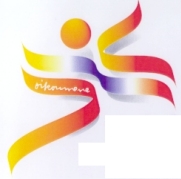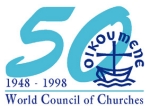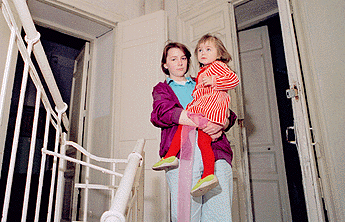

No. 5

|
WCC Anniversary and Eighth Assembly |

|
|
Feature Service No. 5 | ||
 en français
en français
 auf Deutsch
auf Deutsch
 en español
en español
The Orthodox were thus a central part of the "ecumenical stirrings" at the beginning of the twentieth century, and helped to encourage the formation and continuation of the movements which would combine forces in 1948 to form the World Council of Churches.
From the very beginning, then, the Orthodox have had a relationship with modern ecumenism that is characterised by enthusiasm and by discomfort, by encouragement and criticism, by joy and sorrow. To begin to explain this paradox, it may help for me as an Orthodox Christian to introduce who we are.
The ancient beginnings of the Orthodox Church are important to us, and not only because they are ancient. We Orthodox believe in a continuity of faith, of teaching, and of community which has existed from the establishment of the Christian Church, and we believe furthermore that this continuity is tangible and locatable. When we confess in the Nicene Creed our belief in "One Holy Catholic and Apostolic Church" we see ourselves as that Church. It isn’t that we limit all truth, all church reality, or all activity of the Holy Spirit, to the Orthodox Church. But we do believe that the historical splits, because of which world Christianity is now so visibly divided, were splits from the 'right beliefs' of Orthodoxy. More needs saying on this point, for it undergirds some of the greatest difficulties in the encounter between Orthodox and non-Orthodox, and between Orthodox and ecumenical institutions.
The Church, the Churches, and the World Council of Churches
However, once again, the Orthodox do not limit all truth and grace to their own church. And it is precisely the joyous discovery of the great deal which we hold in common with other Christian traditions (such as faith in the One Trinitarian God, faith in Jesus Christ as Lord and Saviour), together with the constructive identification of what it is within our faith and life that also divides us as Christians today, which is the raison d’être of our participation in the ecumenical movement. Yet the tension between the two basic understandings of the Universal or "ecumenical" Church cuts to the heart of the enterprise of modern ecumenism. While it has been carefully addressed in the policy documents of the WCC since its inception, there continue to be misunderstandings, insensitivities, not to mention disinformation (on the part of Orthodox and non-Orthodox groups that are outwardly hostile to the WCC), surrounding that tension.
(For balance, it needs to be said that from the perspective of non-Orthodox in the WCC, we Orthodox ourselves can come across as frustrating, if not baffling. Our self-identification with the Universal Church can seem arrogant, our working style can appear inconsistent and irrational, our ways and thought arcane and unprone to self-criticism. And sometimes it isn’t difficult to see how this impression can perpetuate itself.)
None of the tensions or discomforts I have described is experienced uniquely by the Orthodox. But the Orthodox are the most clearly-definable body of member churches which to some extent are experiencing them all, and furthermore, experiencing them to the degree that, in the case of many churches, their very membership is under threat.
The Harare Assembly will feature an open forum called the Padare (the Shona word for "meeting place"), and many of the concerns on display are liable to be difficult for many Orthodox to comprehend or appreciate. While the WCC officially is not aligning itself with the Padare offerings, the distinction between Assembly visibility and WCC policy will not readily be grasped. The difficulties in this area have begun already: certain churches, for example, have reacted strongly against the WCC's sanction of Padare offerings presented by openly gay groups.
On the hopeful side, the WCC’s most recent policy statement, "Towards a Common Understanding and Vision of the WCC", is a careful and thoughtful piece which reflects also a process of restructuring affecting all levels of WCC activity. This process of taking stock and taking action, which will be discussed and adopted at the Assembly, could bear the fruit of a more mutually fulfilling relationship between the Orthodox churches and the rest of the WCC.
Why remain?
And much as we hate to admit it, many items that are squarely on the socio-political and moral/ethical agenda of WCC activity need to be placed more centrally on our agenda as well.
The relationship between the Orthodox and the World Council of Churches has its hopes and problems stemming from all sides. But may this relationship continue, boldly, courageously, with all honesty and goodwill!
There from the start
In 1920, long before the formation of the World Council of Churches, the Ecumenical Patriarchate addressed an encyclical "Unto the Churches of Christ Everywhere". This was a call from the senior patriarchate of the Eastern Orthodox Church to all the Christian churches to overcome mistrust and bitterness, and to explore together the fellowship that exists between them even in spite of doctrinal differences. The encyclical called for several practical steps to be taken to bring churches into a closer relationship, including the inauguration of new relationships and exchanges across a broad spectrum of church life. Among these practical suggestions was that a "league" or "fellowship" be set up, following the example of the recently established League of Nations.
Who are the Orthodox?
The word "Orthodox" - which comes from the Greek word for "right belief" or "right glory" - has come to describe two large families of local autocephalous (self-governing) churches, often called "Eastern" and "Oriental", which see themselves in an unbroken continuity with the early Church established by Christ and his apostles. The two families severed communion with each other in the fifth century over issues that involved a blend of theological, political and cultural factors. (And if full reconciliation is imminent, as we can hope it is, this is in no small part due to what we have learned of each other through our participation in the ecumenical movement.) The "Eastern" Orthodox are historically based in Asia Minor, Greece, Russia, the Balkans and the Middle East; the "Oriental Orthodox" are historically located in Armenia, Asia Minor, the Middle East, India, Egypt and Ethiopia. Yet, particularly with the increase in the movement of peoples in the past century, the Orthodox presence is felt worldwide, with significant communities and thriving missions on all five continents.
The word "ecumenical" derives from the Greek "oikoumene", which means "the whole universe". Ecumenical therefore means universal. But although the word "oikoumene" dominates WCC language, not to mention the WCC logo, the member churches interpret it in different ways. To put it perhaps a little too simply, for many people the Christian churches of all the traditions in which they exist today - Protestant, Catholic, Orthodox - together constitute the "Universal Church". We Orthodox on the other hand identify the Orthodox Church with the Universal Church. Therefore, the broad consensus within the Orthodox Church on matters of faith and church life is something which needs to be shared by the other churches if there is to be greater unity. (The Roman Catholics perceive their church, and church unity, in the same way.)
Critical times
These are critical times in the encounter between the Orthodox churches and the WCC. A painful sign of the tensions which seem to be increasing in current years was the withdrawal from WCC membership of the Orthodox Church of Georgia in May 1997. Without exception, all Orthodox churches today are in the process of serious reflection among and between themselves concerning the nature and purpose of their participation in institutionalised ecumenism. What are some of the tensions being experienced?
The Orthodox situation
Many difficulties arise out of recent dimensions on the political sphere. The fall of Communism has resulted not only in a sudden increase of religious liberty and opportunity which has led to a renaissance of spirituality and church life, but also a rise in nationalism and xenophobia which impedes receptivity to ecumenical endeavours. Among Orthodox in the West, other considerations can conspire to foment suspicion or hostility towards inter-Christian cooperation: emigrants from predominantly Orthodox countries, and also converts from non-Orthodox churches, sometimes define their Orthodox identity by emphasising what they are not, as much as by stressing what they are. To all of this one can add also the increase of fundamentalism which is felt worldwide and across confessional lines.
The problem of proselytism
Some Orthodox identify ecumenical involvement with a condoning of proselytism. hey believe that since ecumenism implies receptivity to different Christian churches it also implies approving the practice of sending missionaries to chiefly Orthodox countries to "steal sheep" or convert them from Orthodoxy. In fact, as proselytism is by nature an overtly anti-ecumenical endeavour, the WCC has repeatedly and in detail condemned the practice.
The WCC climate
More generally, many Orthodox have increasing difficulty aligning themselves with what they perceive as the character and agenda of the WCC. When theological, socio-political or moral/ethical themes are discussed, some feel that there appear to be virtually no limits to the diversity that is tolerated. To many, although the WCC does not draw up or dictate policies of its own, there is a de facto tendency to place more conservative moral or theological positions on the defensive. Worship services in ecumenical settings can tend strongly towards a character that is quite foreign to Orthodox sensibilities. In all, Orthodox participants in the WCC feel that, thanks to a number of factors, they are a minority, sometimes even a special interest group, among a large Protestant majority.
A critical Assembly
If these are indeed critical times in the Orthodox encounter with the WCC, then the upcoming Eighth Assembly of the WCC, to be held later this year in Harare, will be a critical event. Together with the opportunities for fellowship and discovery presented by a happening such as this, all of the concerns set out above will have an opportunity to be aggravated. As at past Assemblies, the worship events will alternately invite and alienate. There will again be no joint celebration of the eucharist - the Orthodox understanding of the sacrament of communion (seeing it as the highest expression of unity in faith) forbids the sharing of that sacrament with non-Orthodox - and this will again be a focus of pain for all sides.
Conclusion
Joys and sorrows
The upcoming Assembly in Harare will be attended and observed by Orthodox with a blend of hope and apprehension, acceptance and criticism - that paradoxical blend of enthusiasm and consternation which we now know is nothing new. But we also now know that the tensions are running at an all-time high.
From the somewhat bleak picture I have painted, one could reasonably ask whether I think that the Orthodox should remain members of the Council. The answer is yes. The work for the full visible unity of Christians is holy work. Even as we Orthodox locate the Universal Church within the communion of our Church, it would be impious not to look outside our church boundaries to see, to affirm, and to engage with all that is real and true and beautiful there - all that is of Christ. We all share a responsibility before God to seek to discern what in our Christian disunity is due merely to misunderstandings and historical-cultural factors, and what needs addressing on the level of theology and life. All of this can be done to some extent without the World Council of Churches. But the WCC is a unique instrument, the most comprehensive global fellowship we have.

Young woman with her child in a
St Petersburg (Russia) home for unmarried mothers
run by an ecumenical committee.
(WCC/Peter Williams)
Orthodox who are ambivalent to the ecumenical endeavour often forget how much their churches benefit materially from assistance rendered by or through the WCC. Aside from this prosaic but significant fact, our encounter with other Christians assists us in the much-needed renewal of our church life today. When we come before inter-Christian forums preaching our glorious theology, we know that our failures to live up to it are under full view.
Dr Peter Bouteneff is a member of the Orthodox Church in America (Eastern) and on the WCC staff as an Executive Secretary within the Faith and Order stream.
Peter Bouteneff is available for further comment and interview. Radio journalists please note that for interview purposes we have an ISDN line installed in our radio studio using a CCS Codec M66I 64K.
Use of the article must credit Peter Bouteneff as author. Editors are free to shorten the article if they wish but this should be acknowledged. Please send a copy of anything you publish for our records. Thank you.
Photographs to accompany this article are available upon request. Use of the photographs is free when used with the article. Other use will attract the usual WCC fees.
Good quality reproductions of the photos
accompanying this text (see list below) are available via Internet or ordinary mail. To order a photo via Internet, just click on the photo of your choice. That takes you to our Photo Oikoumene homepage. There you click on the appropriate theme in the Photo Oikoumene index. When you have located your photo, complete the online order form. Photo Oikoumene will send the photo electronically as an attached file, at 300dpi resolution, JPEG format.
If you want a colour slide, or colour or b/w photo by ordinary mail, send an E-mail inquiry to photo
Please also feel free to download the Assembly and 50th Anniversary logos directly from this page, or contact us if you wish us to airmail them to you.
° Orthodox delegation, Lausanne 1927
° Armenian Orthodox Church, Nagorno-Karabagh (5852-2)
° Russian Orthodox Church (6087-0A)
° Single mother, St Petersburg (6118-5)
John Newbury
Press & Information Officer
P.O. Box 2100
1211 Geneva 2, Switzerland
Tel.: (+41 22) 791 6152/51
Fax: (+41 22) 798 1346
E-mail: media
 Feature Service list
Feature Service list
 8th Assembly & 50th Anniversary homepage
8th Assembly & 50th Anniversary homepage
 Press Release list
Press Release list
 WCC homepage
WCC homepage